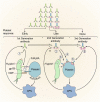The ITP syndrome: pathogenic and clinical diversity
- PMID: 19395674
- PMCID: PMC2710913
- DOI: 10.1182/blood-2009-01-129155
The ITP syndrome: pathogenic and clinical diversity
Abstract
Immune thrombocytopenia (ITP) is mediated by platelet autoantibodies that accelerate platelet destruction and inhibit their production. Most cases are considered idiopathic, whereas others are secondary to coexisting conditions. Insights from secondary forms suggest that the proclivity to develop platelet-reactive antibodies arises through diverse mechanisms. Variability in natural history and response to therapy suggests that primary ITP is also heterogeneous. Certain cases may be secondary to persistent, sometimes inapparent, infections, accompanied by coexisting antibodies that influence outcome. Alternatively, underlying immune deficiencies may emerge. In addition, environmental and genetic factors may impact platelet turnover, propensity to bleed, and response to ITP-directed therapy. We review the pathophysiology of several common secondary forms of ITP. We suggest that primary ITP is also best thought of as an autoimmune syndrome. Better understanding of pathogenesis and tolerance checkpoint defects leading to autoantibody formation may facilitate patient-specific approaches to diagnosis and management.
Figures




References
-
- He R, Reid DM, Jones CE, Shulman NR. Extracellular epitopes of platelet glycoprotein Iba reactive with serum antibodies from patients with chronic idiopathic thrombocytopenic purpura. Blood. 1995;86:3789–3796. - PubMed
-
- Stasi R, Evangelista ML, Stipa E, Buccisano F, Venditti A, Amadori S. Idiopathic thrombocytopenic purpura: current concepts in pathophysiology and management. Thromb Haemost. 2008;99:4–13. - PubMed
-
- Roark JH, Bussel JB, Cines DB, Siegel DL. Genetic analysis of autoantibodies idiopathic thrombocytopenic purpura reveals evidence of clonal expansion and somatic mutation. Blood. 2002;100:1388–1398. - PubMed
-
- Satoh T, Pandey JP, Okazaki Y, et al. Single nucleotide polymorphisms of the inflammatory cytokine genes in adults with chronic immune thrombocytopenic purpura. Br J Haematol. 2004;124:796–801. - PubMed
-
- Panitsas FP, Theodoropoulou M, Kouraklis A, et al. Adult chronic idiopathic thrombocytopenic purpura (ITP) is the manifestation of a type-1 polarized immune response. Blood. 2004;103:2645–2647. - PubMed
Publication types
MeSH terms
Substances
Grants and funding
LinkOut - more resources
Full Text Sources
Other Literature Sources
Medical

